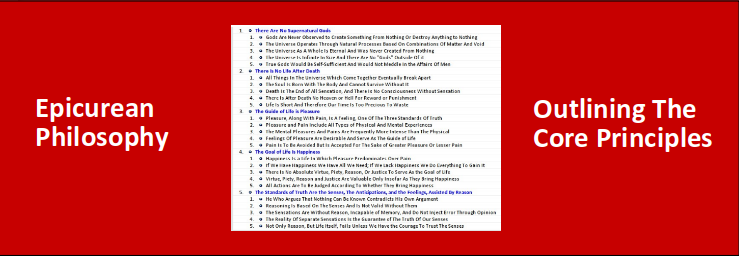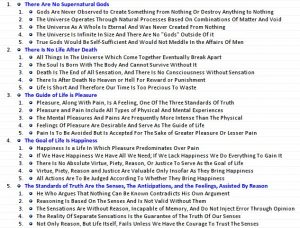Happy Twentieth of November! My Latest Outline of Fundamentals
Happy Twentieth of November!
Over the last month I have spent a considerable amount of time refining what I think is my most best summary of the fundamentals of Epicurean philosophy. For this 20th I’d like to recap where I am on that, with this list of five major points, each one broken down into five subpoints. I hope you find this helpful:
- There Are No Supernatural Gods
- Gods Are Never Observed to Create Something From Nothing Or Destroy Anything to Nothing
- The Universe Operates Through Natural Processes Based On Combinations Of Matter And Void
- The Universe As A Whole Is Eternal And Was Never Created From Nothing
- The Universe Is Infinite In Size And There Are No “Gods” Outside Of it
- True Gods Would Be Self-Sufficient And Would Not Meddle In the Affairs Of Men
- There Is No Life After Death
- All Things In The Universe Which Come Together Eventually Break Apart
- The Soul Is Born With The Body And Cannot Survive Without It
- Death Is The End of All Sensation, And There Is No Consciousness Without Sensation
- There Is After Death No Heaven or Hell For Reward or Punishment
- Life Is Short And Therefore Our Time Is Too Precious To Waste
- The Guide of Life is Pleasure
- Pleasure, Along With Pain, Is A Feeling, One Of The Three Standards Of Truth
- Pleasure and Pain Include All Types of Physical And Mental Experiences
- The Mental Pleasures And Pains Are Frequently More Intense Than The Physical
- Feelings Of Pleasure Are Desirable And Serve As The Guide of Life
- Pain Is To Be Avoided But Is Accepted For The Sake of Greater Pleasure Or Lesser Pain
- The Goal of Life Is Happiness
- Happiness Is a Life In Which Pleasure Predominates Over Pain
- If We Have Happiness We Have All We Need; If We Lack Happiness We Do Everything To Gain It
- There Is No Absolute Virtue, Piety, Reason, Or Justice To Serve As the Goal of Life
- Virtue, Piety, Reason and Justice Are Valuable Only Insofar As They Bring Happiness
- All Actions Are To Be Judged According To Whether They Bring Happiness
- The Standards of Truth Are the Senses, The Anticipations, and the Feelings, Assisted By Reason
- He Who Argues That Nothing Can Be Known Contradicts His Own Argument
- Reasoning Is Based On The Senses And Is Not Valid Without Them
- The Sensations Are Without Reason, Incapable of Memory, And Do Not Inject Error Through Opinion
- The Reality Of Separate Sensations Is the Guarantee of The Truth Of Our Senses
- Not Only Reason, But Life Itself, Fails Unless We Have the Courage To Trust The Senses
As Seneca recorded: Sic fac omnia tamquam spectet Epicurus! So do all things as though watching were Epicurus!
And as Philodemus wrote: “I will be faithful to Epicurus, according to whom it has been my choice to live.”
Additional discussion of this post and other Epicurean ideas can be found at EpicureanFriends.com.


